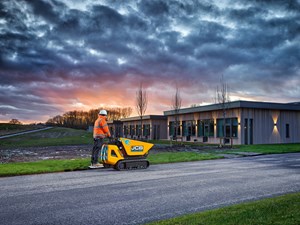United Rentals outlines sustainable practices to reduce equipment emissions
(UI) – United Rentals, Inc. has outlined ways companies can implement sustainable business practices that reduce equipment greenhouse gas (GHG) emissions while maintaining jobsite productivity and safety. United Rentals released a white paper, "Roadmap to Low-Emission and Zero-Emission Jobsites," which shares four practical steps to reduce emissions and the tools and equipment to make sustainability strategies a reality on the jobsite.
These practices employ digital tools to guide fleet sustainability decisions and greener equipment options that help construction and industrial companies reach lower-emission targets without erasing profit margins.
“For companies with budgets large or small, reducing jobsite emissions is possible now,” said Grant Zoldowski, Director of Environmental Management, United Rentals. “A smart jobsite sustainability strategy starts with data. Targeting the predominant sources of emissions on projects and jobsites allows companies to focus their efforts and dollars on changes that will yield the biggest results. This approach provides the foundation for more sustainable power generation, battery storage and electric equipment options.”
Here are four initiatives companies can take today to make their jobsites more sustainable.
Identify the biggest improvement opportunities: Companies can use data to guide decisions around fleet sustainability efforts to identify changes that yield the biggest return on investment.
Embrace power generation alternatives: New power generation options open the door to greener operations that provide the power needed for productivity and safety. Cleaner-burning generators that use propane, natural gas, renewable diesel or hydrogen are available now. Power options include combining solar panels with a battery to provide a quiet, zero-emission renewable energy generator.
Leverage battery energy storage: New energy storage solutions enable companies to reduce the use of emission-generating portable power equipment. Bigger and better standalone batteries have the power to replace some diesel generators. Hybrid power systems that use a battery to store excess power can slash generator run time along with fuel use and emissions.
Incorporate electric or hybrid equipment: Electric equipment offers performance on par with diesel-fueled equipment while eliminating direct emissions. Lower operating costs and significantly reduced maintenance needs partially offset the higher upfront expense. Lithium-ion batteries and electric engines are essentially maintenance-free.
“Renting provides an opportunity for companies to experiment with more sustainable solutions such as electric machines, portable power options, and battery energy storage systems without investing in new equipment. All of these technologies can work together to reduce the reliance on petroleum-based diesel and help companies shift to lower-emission and even zero-emission fleets,” said Zoldowski.
Related News
From Archive

- Glenfarne Alaska LNG targets late-2026 construction start for 807-mile pipeline project
- U.S. water reuse boom to fuel $47 billion in infrastructure spending through 2035
- $2.3 billion approved to construct 236-mile Texas-to-Gulf gas pipeline
- Major water pipe break in Puerto Rico hits over 165,000 customers
- Potomac River Tunnel project enters construction phase beneath Washington, D.C.
- Pennsylvania American Water launches interactive map to identify, replace lead water service lines
- Trump's tariffs drive $33 million cost increase for Cincinnati sewer project
- Utah city launches historic $70 million tunnel project using box jacking under active rail line
- Tulsa residents warned after sewer lines damaged by boring work
- Fatal trench collapse halts sewer construction in Massachusetts; two workers hospitalized




Comments